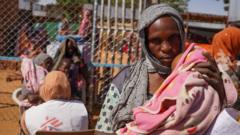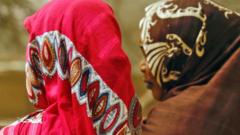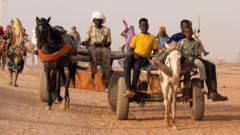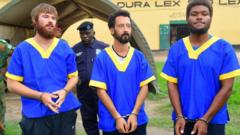Amid rising tensions between South Sudan and the US over deportation policies, South Sudan's government has decided to accept the return of a man deported from the US, previously misidentified as a South Sudanese national. This decision comes after the US announced a suspension of visas for all South Sudanese citizens, a move linked to South Sudan's failure to accept the return of its nationals.
South Sudan Reverses Deportation Stance Amid Tense Visa Dispute with US
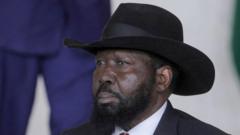
South Sudan Reverses Deportation Stance Amid Tense Visa Dispute with US
In an unexpected reversal, South Sudan agrees to accept a man deported from the US, seeking to ease a growing diplomatic conflict over visa prohibitions imposed on its citizens.
South Sudan has confirmed it will accept the return of a man recently deported from the US, in a significant move to address escalating tensions over immigration policies between the two nations. Initially, US Secretary of State Marco Rubio announced a ban on visa issuance for all South Sudanese citizens, following the South Sudan government's refusal to accept its citizens being deported from the US. The situation intensified after South Sudan's foreign ministry responded, claiming the deported individual was incorrectly classified as a South Sudanese and should have been recognized as Congolese.
In a recent statement, South Sudan’s foreign ministry announced that in the "spirit of friendly relations," the government will facilitate the arrival of this individual in Juba. They acknowledged the man as a national of the Democratic Republic of Congo, aiming for his return as early as Wednesday. Furthermore, the ministry expressed commitment to assisting the return of verified South Sudanese nationals facing deportation from the US.
This visa row marks the US’s unprecedented move to revoke visas for an entire country's citizens, a measure linked to the new administration's hardline immigration stance. Rubio stated that the current conditions, driven by South Sudan's non-cooperation, justify the decision. The government’s assertion of the deported man's nationality has been dismissed by US Deputy Secretary of State Christopher Landau, reinforcing the validity of his initial confirmation by South Sudan's embassy in Washington.
Tensions are further compounded by alarming political instability in South Sudan, as its First Vice-President Riek Machar faces house arrest, raising concerns about potential renewed civil conflict. The US, closely monitoring the situation, has recently ordered non-emergency personnel to evacuate amid increasing violence that threatens a fragile peace agreement. The backdrop of instability comes as South Sudanese in the US, previously protected by Temporary Protected Status (TPS), face uncertain futures with imminent expiration of their protective status.
The evolving situation underscores the complex interplay of international policy, immigration, and internal strife, as both nations navigate a challenging path forward.
In a recent statement, South Sudan’s foreign ministry announced that in the "spirit of friendly relations," the government will facilitate the arrival of this individual in Juba. They acknowledged the man as a national of the Democratic Republic of Congo, aiming for his return as early as Wednesday. Furthermore, the ministry expressed commitment to assisting the return of verified South Sudanese nationals facing deportation from the US.
This visa row marks the US’s unprecedented move to revoke visas for an entire country's citizens, a measure linked to the new administration's hardline immigration stance. Rubio stated that the current conditions, driven by South Sudan's non-cooperation, justify the decision. The government’s assertion of the deported man's nationality has been dismissed by US Deputy Secretary of State Christopher Landau, reinforcing the validity of his initial confirmation by South Sudan's embassy in Washington.
Tensions are further compounded by alarming political instability in South Sudan, as its First Vice-President Riek Machar faces house arrest, raising concerns about potential renewed civil conflict. The US, closely monitoring the situation, has recently ordered non-emergency personnel to evacuate amid increasing violence that threatens a fragile peace agreement. The backdrop of instability comes as South Sudanese in the US, previously protected by Temporary Protected Status (TPS), face uncertain futures with imminent expiration of their protective status.
The evolving situation underscores the complex interplay of international policy, immigration, and internal strife, as both nations navigate a challenging path forward.





